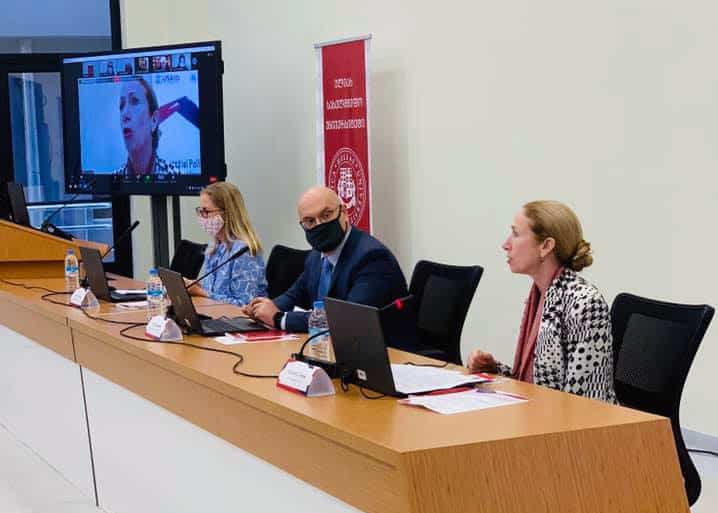
ME&A Teams Collaborate and Adapt to Meet COVID-19 Challenge
When COVID-19 emerged as a global pandemic in March, ME&A instituted mandatory telework and travel restrictions and began sorting out how our programs could continue operating remotely or even be adapted to assist USAID in addressing COVID-19. Since then the COVID-19 global health threat has broadened to impact all of our daily lives, including ME&A headquarters, as well as the local economies where our offices are located.
I am thankful to report ME&A successfully applied USAID’s Collaborating, Learning, and Adapting (CLA) framework – what we usually do in the field – to ourselves, enabling our work to continue remotely without any projects paused. This is no small thanks to ME&A teams’ agility in rethinking how we do things to integrate digital innovations, hybrid methodologies (online/face-to-face), and other necessary changes into work plans to keep our overseas project teams safe and replace the need to send additional experts overseas.
At ME&A we will continue to use CLA to adapt our approaches to the realities of the global pandemic using the most innovative, responsible, cost effective, and safe ways we can find. Among the digital innovations in our current toolkit include web and SMS surveys, computer assisted telephone interviewing (CATI), remote focus groups, and geographic information systems (GIS) satellite imagery and remote sensing to collect data and artificial intelligence and analytics for processing and visualizing data. Specific software applications include Esri’s ArcGIS, Survey123, Dashboards, storymaps, and Living Atlas as well as Zoom, WhatsApp, LoopUp, Viber, and Skype.
ME&A has also increased our contract portfolio over the past seven months, including helping USAID manage COVID-19 relief. The USAID Bureau for Global Health awarded ME&A a five-year Indefinite Delivery Indefinite Quantity (IDIQ) contract in May to provide evaluation, assessment, and learning support for health-related projects and activities, which includes COVID-19 as part of a broader portfolio. USAID funded five assessments under the new project so far. Moreover, ME&A is assisting USAID with COVID-19 management through activities under separate contracts in Bangladesh, El Salvador, Guatemala, Nicaragua, and Tanzania.
In total, ME&A has either completed or continued as planned more than 75 activities since March. A select list includes:
Advanced Science and Partnerships for Integrated Resource Development (ASPIRED)
- Workshop on Calculated Values of Water Balance and Water Supply and Demand Balance in the Ararat Valley with the Ministry of Environment Working Group (ongoing)
- Improving the Efficiency of Irrigation in Pokr Vedi Village (completed during COVID-19)
- Improving the Efficiency of Irrigation in Khachpar Village (completed during COVID-19)
- Improvement of Water Supply in Yeghegnut Village (completed during COVID-19)
- Virtual Inspection and Final Report of the Aquaculture Technology Transfer Center and Fishery (started and completed during COVID-19)
- Identification of New Pilot Projects in the Villages of Mrgashat, Hovtashat, Sardarapat, and Griboyedov (started and completed during COVID-19)
- Development of Methodology for Assessment of Self-Purification Capacity of Rivers (ongoing)
- Organization of Virtual Project Opening Events for the Yeghegnut and Pokr Vedi Projects with the Virtual Participation of USAID/Armenia, Participating Government Agencies, Community Leaders, and Partners (completed during COVID-19)
Bangladesh Monitoring, Evaluation, and Learning (BMEL)
- Final Performance Evaluation for the Policy Research and Strategy Support Program for Food Security and Agricultural Development in Bangladesh (ongoing with field work completed)
- COVID-19/Analysis of the Changing Development Needs and Priority Actions for USAID/Bangladesh/Rapid Assessment (ongoing – final report submitted)
- Final Performance Evaluation of the Cereal Systems Initiative for South Asia/Mechanization and Irrigation Phase I (ongoing – field work completed)
- Final Performance Evaluation for USAID/Bangladesh Counter-Trafficking-in-Persons Activity (ongoing)
El Salvador Monitoring, Evaluation and Learning Initiative (MELI)
- USAID/Nicaragua Third Party Monitoring (ongoing)
- DO2 – Safety and Competitiveness of At-Risk Children and Youth in Targeted Areas Improved, Final Performance Evaluation (ongoing)
- USAID/El Salvador Country Development Cooperation Strategy Contextual Indicator Database Updates (ongoing)
- U.S. Government Humanitarian Assistance to Victims of Tropical Storm Amanda/Cristobal Tropical Storm Dashboard in El Salvador (completed during COVID-19)
- U.S. Government Emergency Assistance for COVID-19 Dashboard in El Salvador (ongoing – dashboard is updated on a daily basis)
- Map of Plan for Secure El Salvador (Plan El Salvador Seguro-PESS), Territorial Control Plan (Plan de Control Territorial-PCT), and Urban Hubs Municipalities (completed during COVID-19)
- Map of Urban Areas of the Municipalities of the Urban Hubs (completed during COVID-19)
Feed the Future Global Program Evaluation for Effectiveness and Learning (PEEL)
- Feed the Future Performance Evaluation of the Cereal Value Chain in Mali (completed during COVID-19)
- Feed the Future Performance Evaluation of the Livestock for Growth Value Chain in Mali (completed during COVID-19)
- Mid-Term Performance Evaluation of the Feed the Future Ethiopia Value Chain Activity (Computer Assisted Telephone Interviews [CATI] survey completed)
- Feed the Future Mali Zone of Influence Survey 2019-Baseline (ongoing – final report under preparation)
- Feed the Future Uganda Zone of Influence Survey 2019-Baseline (ongoing – final report under preparation)
- Strengthening Value Chains Evaluation in the DRC (completed during COVID-19 – redesigned to address COVID-19 challenges)
Tanzania Data for Development (D4D)
- Cost Efficiency, Revenues, and Expenditure Assessment of Four Public Systems Strengthening Interventions in Tanzania (final report submitted)
- Youth Assessment for Strategy Development (ongoing – draft report submitted)
- Evaluating the Impact of COVID-19 in Tanzania: A Qualitative and Quantitative Assessment of the Epidemic in Tanzania (ongoing – draft report submitted)
- Tanzania Education Landscape Analysis (ongoing)
- Elizabeth Glaser Pediatric AIDS Foundation/USAID Boresha Afya Data Quality Assessment DQA (completed during COVID-19)
- Tusome Pamoja DQA (completed during COVID-19)
- Tanzania Marketing and Communication/USAID Social Enterprise Support Activity DQA (completed during COVID-19)
- Tulonge Afya DQA (completed during COVID-19)
- Vectorlink DQA (ongoing)
- World Education Inc. DQA (ongoing)
USAID/Washington Learning Center Training
- Engineering and Construction Contracting Management Training for USAID Employees (conducted during COVID-19)
Other IDIQs
- Mid-Term Performance Evaluation of the Cambodia Malaria Elimination Project (completed during COVID-19 – redesigned to address COVID-19 challenges)
- Final Performance Evaluation of the Socio-Economic Development Activity Featuring Outcome Harvesting (completed during COVID-19)
- Final Performance Evaluation of Dignity and Rights in Central Asia Learning from Evaluations and Assessments for Development (completed during COVID-19)
- Evaluating the Effectiveness of the Bureau of Population, Refugees, and Migration at the Department of State (PRM)-Funded Programs for Refugees and Internally Displaced Persons in the Caucasus (Russia, Georgia, Azerbaijan, and Armenia) (ongoing)
During the final months of our USAID/Georgia Human and Institutional Capacity Development 2020 Activity (HICD 2020), running from September 2015 through November 2020, HICD 2020 continued achieving tangible improvements in the human and institutional capacity of USAID’s strategic partner organizations in Georgia. Since March, HICD 2020 started or completed technical assistance and training for more than a dozen governmental, non-governmental, and for-profit entities. They included the Civil Service Bureau; Enterprise Georgia; Georgia Parliamentary Research Center; Georgia Young Lawyer’s Association; Georgian Democratic Initiative; Georgian Gas Transportation Company; Human Rights Education and Monitoring Center; Ilia State University; International Society for Fair Elections and Democracy; McLain Association for Children in Georgia; Peace Fund; Public Defender Office; Rights Georgia; Service for Accounting, Reporting, and Auditing Supervision; and Zurab Zhvania School of Public Administration.
Many of ME&A’s COVID-19 digital adaptations to accomplish all of the above – out of necessity – will likely remain valuable alternative tools in our toolkit when the pandemic ends. Facing an ever-expanding digital ecosystem, ME&A will continue to expand our own digital and creative capabilities to better collaborate, learn, and adapt to a post-pandemic world.
- About the Author
- Latest Posts
Teresita Perez, ME&A’s President and CEO, has more than 35 years of experience managing international development programs and has held a variety of senior-level positions throughout her career. Her expertise spans international development, management, government contracting, institutional capacity building, and support toward sustainable development.



